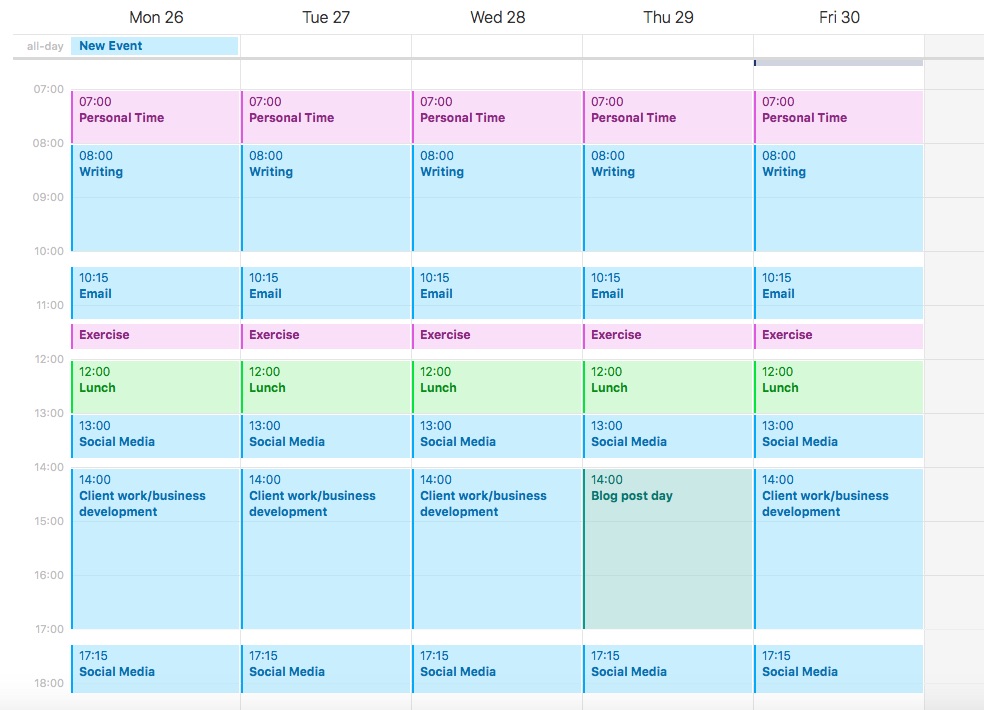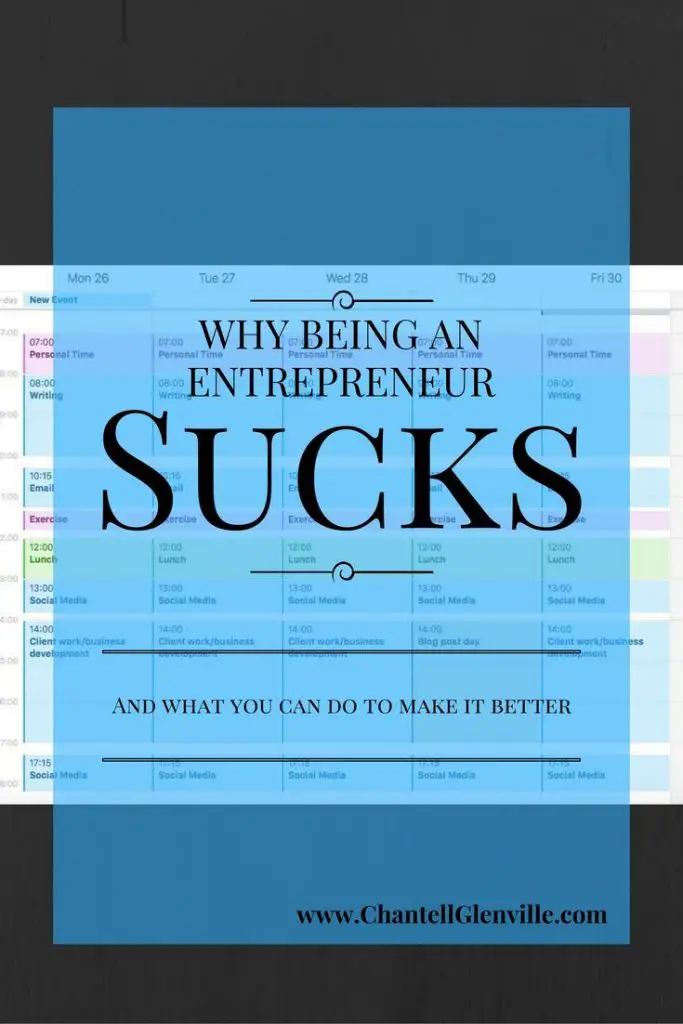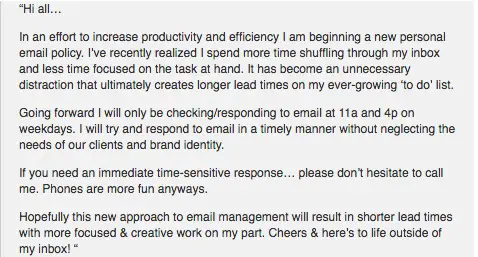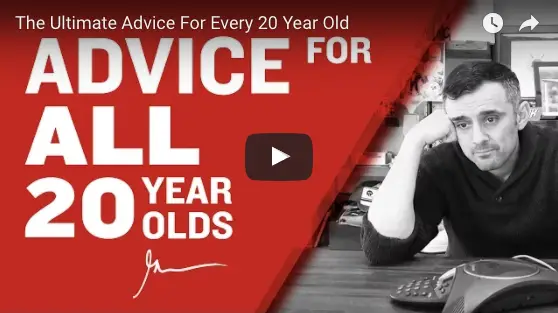It’s easy to look at those running their own businesses, getting to decide what they do or don’t do and think it must be great to be them. What a charmed life they must lead. But as soon as you set up your own business, you quickly realise that the reality of it is actually pretty crappy at times. In a lot of instances, being an entrepreneur sucks!
There are a huge number of benefits to running your own business, so much so that I don’t think I could ever go back to being a fully fledged card holding employee now, but yet sometimes doing my own thing makes me despair in a way I never even got close to whilst working for someone else.
Working for yourself can be one of the most soul-destroying ways to spend your time. And it can get lonely too. You don’t always have colleagues to bitch and moan to about the stuff you’re struggling with or when things go wrong and it can feel like you’re the only one fighting these battles. But you’re not. Being an entrepreneur sucks for everyone at times.
Being an Entrepreneur Sucks Because…
- Not all tasks are quick. Sometimes you can spend days if not weeks trying to get one thing sorted and in the meantime it makes it feel like you’re a failure who’s achieved nothing.
- You don’t have a team of people around you that have all the skills you need to achieve everything you’re trying to do. Therefore instead of a job taking a short period of time for someone who knows what they’re doing you have to invest time and effort in learning how to do it yourself.
- A lot of what you do will be creative. I love doing creative things, they’re my favourite type of work and it’s necessary to focus your attention on creativity if you’re working for yourself as that’s where new ideas about how to do things come from, but there’s no on/off switch for creativity. Sometimes it flows, sometimes it doesn’t *sigh*.*
- If you’re overworking and extremely stressed out, you’ve got no one to blame but yourself. You chose to do this. You control your own time so if you’re having a stress filled melt down it’s all your own fault. You can no longer blame your shitty company or manager for being the ones to put you in that position. IT’S ALL ON YOU.
Since I’ve focused on building the businesses I’ve set up myself there have been countless times where I’ve wanted to give up. Where I’ve been stressed, have found myself sat inside working 14-hour days feeling like I’ve achieve nothing despite all those hours of work. I’ve found as time goes on the only way I can keep my sanity through all of this is by recognising the different trials working for yourself posses and putting systems in place to overcome them. If you’re having a “working-for-yourself-related-meltdown” I’d strongly suggest trying the following for at least a month. It will make a huge difference to your productivity and more importantly your sanity.
Look Back
If you’re in a rut, feeling like you’ve achieved nothing, put down what you’re doing right now, and take a look at what you have achieved in the last, week, month and quarter. When we’re in the thick of things with our heads down, working away it’s hard to see how far we’ve come. We forget what we have achieved and focus on what we’ve haven’t.
By about April this year, I felt like I’d achieved nothing. But when I gave myself a second to look back and actually think about all the tangible things I’d created since the beginning of the year I’d realized I’d: created 4 websites, a successful blog, had my first articles published by other platforms, developed 4 half-day training courses, finished writing my first book “What Clients Really Want (And The S**t That Drives Them Crazy)”
and had all the marketing materials ready for launch of the book. That’s no small feat but in the thick of it I couldn’t see any of that, just the things that I hadn’t achieved.Each time you take a look back actually write a physical list of everything you have done. That way when you start to feel despondent again you’ll have a quick reference point to remind yourself that you are actually awesome.
Recognise the size of goals
Part of the reason entrepreneurs so frequently end up feeling despondent is because we focus on the big overarching goals, ignoring the magnitude of what it would actually take to achieve them. We don’t break them down into the small goals, only focusing on the final outcome we desire but when we do that we set ourselves up for failure. It takes time to build a business. You need to be clear on all the steps that have to take place in order to achieve those bigger goals. Trying to tackle things in big chunks will eventually get the job done but you’re likely to feel like you’re achieving nothing in the months it takes to accomplish that larger goal. Set yourself small wins along the way with appropriate deadlines for them so that you recognise the progress you’re making
Take little breaks & use batching
Even breaks that are as short as 5 or 10 minutes can be long enough to allow our brains to reset and get ready to tackle the next task at hand. Short breaks can also be extremely beneficial if you’re using batching to increase your productivity when working. Batching is where you block off chunks of time for specific activities so you do all related tasks together rather than wasting time having to go in and out of platforms/getting your brain to shift between tasks. There are varying degrees as to which you can adopt this. Productivity guru, Tim Ferris for example is a famous proponent of email batching and even suggests people set up email responders such as the below.
Even just batching your email will have a big effect on your productivity but you can take it to the next level and plan your entire workday and even week around batching. Block off certain chunks of time in your calendar for what tasks you will do when, planning your short breaks in so that your brain registers when you’re done with one type of activity and moving onto the next.
For example you could set up batches of time like below so you start each day knowing what tasks you’re going to be doing at what time. If there is a task that you don’t need to do daily but comes around once a week you can also plot that in there, such as where I’ve blocked out “Blog post day” in the Thursday afternoon of the example below (The afternoon block is shown as a solid 3 hour period here for illustration purposes to make “the batch” clear but there should be short breaks within this time and if you think you’ll struggle to make yourself take the breaks plot them into the calendar too with reminders to keep yourself on track).
You’ll notice that in this example schedule I’ve blocked out an hour’s worth of personal time each morning. So as not to lose track of yourself and your own enjoyment of non-work related activities, especially when working on really busy projects, it really helps to start each day by doing something just for you. Whether that is reading, exercise, learning something, meditation; it doesn’t matter, as long as it’s just for you. That way no matter what else happens the rest of the day you’ll have definitely done something just for yourself each day.*****Social media in the above example refers to the work related activity of building up your social profiles for your business and interacting with your fans, not just mindlessly starting at your Facebook feed!*****
Move
When you take the short breaks suggested above, one of the best things you can possibly do in that time is period is some physical exercise. Doing physical exercise will make any break more defined, provide a mental reset for when you sit back down thereby increasing your productivity and give you more energy. Not only that but it will actually make you more positive because of the endorphins that are released as a result. That’s why exercise is so frequently recommended to help combat depression.
If you’re looking for quick work outs you can do in your own home, with no equipment, that will provide that all needed energy boost I’d thoroughly recommend the The Balancing Act by Cody. Some of the classes are only 15 minutes long but because of the nature of the training it will do wonders even in that short period of time. The training is focused on balances which help clear our minds through the concentration required to do them, the balances are hard work therefore providing the endorphin high, the course is based in yoga and therefore is great for stretching out any sore muscles from sitting too long and even better still some of the classes are inversions (headstands) which is one of the quickest ways to give yourself an energy boost. In fact, sometimes if I don’t fancy doing a full training session (or think I’m too busy but I mean really it’s 15 minutes so that’s a load of crap) I’ll actually just take a 5 minute break and go and do (try to do) a few headstands or handstands. They immediately wake you up and reset your brain so you’re ready to go again.
Chill the f**k out
“In a culture of more, more, more, this is one of the most enviable gifts that one can ever possess: the ability to kick one’s feet up—anywhere, at anytime—and think: “Ok, this is good enough for me.” This person, this thing, this present moment, this is enough.”
Ryan Holiday on Thought CatalogIf you have become an entrepreneur you are now in control of your time. You get to decide when you work or play and sometimes to do our best work we need to chill the f**k out first.
I’ve got into spirals of misery before, trying to fix the same problem in my business time and time again getting nowhere and when that’s happened I have always continued to get nowhere until precisely the point at which I’ve taken some time out and gone and done something else
In his brilliant book, Perfect Pitch, Jon Steel talks about this saying that it is through other activities that we actually receive inspiration and the sudden “ah ha” moments that give us the answer to problems we’ve been struggling with. When discussing this he quotes the Japanese philosopher Saki saying:
“When baiting the mousetrap with cheese, always be sure to leave room for the mouse.”
The solution isn’t going to come to you if you stand there going ” Solve it, solve it, solve it”. It will come to you once you stop thinking about it and forcing the answer. This isn’t just some lofty theory (or a nice story we can tell ourselves to make us feel better when taking time out). Scientific studies have been carried out to work out what is going on during this time and why completely down tooling invariably leads us to finding solutions we couldn’t before. Having studied the experiments that have been carried out in this field Benedict Carey, in How we learn, concludes that:
“The mind works on the problem off-line, moving around the pieces it has in hand and adding one or two it has in reserve but didn’t think to use at first.”
Properly switching off from the work you’re doing, taking a day, a weekend or even a week off and chilling the f**k out will actually be beneficial for your work.
In spite of all the trails, and at times misery, being an entrepreneur throws up though I’ve never before felt quite so excited by anything I’ve worked on. That’s the trade off of being an entrepreneur that makes it worthwhile. There are ups and downs but over-all it’s infinitely more fulfilling to be working towards fulfilling your dreams rather than someone else’s.
Have you got any tips that help you keep your sanity while working for yourself? Leave them in the comments below. I’d love to hear about what you all do.
*Whilst there’s no on/off switch for creativity we can train ourselves so that creativity flows more easily and naturally. Find out how to be more creative here.











Great article – Thanks for sharing ????